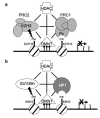Connections between epigenetic gene silencing and human disease
- PMID: 17306846
- PMCID: PMC1892579
- DOI: 10.1016/j.mrfmmm.2006.05.038
Connections between epigenetic gene silencing and human disease
Abstract
Alterations in epigenetic gene regulation are associated with human disease. Here, we discuss connections between DNA methylation and histone methylation, providing examples in which defects in these processes are linked with disease. Mutations in genes encoding DNA methyltransferases and proteins that bind methylated cytosine residues cause changes in gene expression and alterations in the patterns of DNA methylation. These changes are associated with cancer and congenital diseases due to defects in imprinting. Gene expression is also controlled through histone methylation. Altered levels of methyltransferases that modify lysine 27 of histone H3 (K27H3) and lysine 9 of histone H3 (K9H3) correlate with changes in Rb signaling and disruption of the cell cycle in cancer cells. The K27H3 mark recruits a Polycomb complex involved in regulating stem cell pluripotency, silencing of developmentally regulated genes, and controlling cancer progression. The K9H3 methyl mark recruits HP1, a structural protein that plays a role in heterochromatin formation, gene silencing, and viral latency. Cells exhibiting altered levels of HP1 are predicted to show a loss of silencing at genes regulating cancer progression. Gene silencing through K27H3 and K9H3 can involve histone deacetylation and DNA methylation, suggesting cross talk between epigenetic silencing systems through direct interactions among the various players. The reversible nature of these epigenetic modifications offers therapeutic possibilities for a wide spectrum of disease.
Figures

Similar articles
-
Expression analysis of the epigenetic methyltransferases and methyl-CpG binding protein families in the normal B-cell and B-cell chronic lymphocytic leukemia (CLL).Cancer Biol Ther. 2004 Oct;3(10):989-94. doi: 10.4161/cbt.3.10.1137. Epub 2004 Oct 2. Cancer Biol Ther. 2004. PMID: 15467427
-
H1 linker histone promotes epigenetic silencing by regulating both DNA methylation and histone H3 methylation.Proc Natl Acad Sci U S A. 2013 Jan 29;110(5):1708-13. doi: 10.1073/pnas.1213266110. Epub 2013 Jan 9. Proc Natl Acad Sci U S A. 2013. PMID: 23302691 Free PMC article.
-
The indexing potential of histone lysine methylation.Novartis Found Symp. 2004;259:22-37; discussion 37-47, 163-9. Novartis Found Symp. 2004. PMID: 15171245 Review.
-
Silencing of the Il2 gene transcription is regulated by epigenetic changes in anergic T cells.Eur J Immunol. 2012 Sep;42(9):2471-83. doi: 10.1002/eji.201142307. Epub 2012 Jul 13. Eur J Immunol. 2012. PMID: 22684523 Free PMC article.
-
Coordinated chromatin control: structural and functional linkage of DNA and histone methylation.Biochemistry. 2010 Apr 13;49(14):2999-3008. doi: 10.1021/bi100213t. Biochemistry. 2010. PMID: 20210320 Free PMC article. Review.
Cited by
-
The role of histone modifications and variants in regulating gene expression in breast cancer.J Mammary Gland Biol Neoplasia. 2010 Mar;15(1):19-33. doi: 10.1007/s10911-010-9167-z. Epub 2010 Feb 4. J Mammary Gland Biol Neoplasia. 2010. PMID: 20131086 Review.
-
Linking Heterochromatin Protein 1 (HP1) to cancer progression.Mutat Res. 2008 Dec 1;647(1-2):13-20. doi: 10.1016/j.mrfmmm.2008.09.007. Epub 2008 Sep 24. Mutat Res. 2008. PMID: 18926834 Free PMC article. Review.
-
Elaboration, diversification and regulation of the Sir1 family of silencing proteins in Saccharomyces.Genetics. 2009 Apr;181(4):1477-91. doi: 10.1534/genetics.108.099663. Epub 2009 Jan 26. Genetics. 2009. PMID: 19171939 Free PMC article.
-
Tertiary Amine Coupling by Oxidation for Selective Labeling of Dimethyl Lysine Post-Translational Modifications.J Am Chem Soc. 2024 Apr 17;146(15):10621-10631. doi: 10.1021/jacs.4c00253. Epub 2024 Apr 7. J Am Chem Soc. 2024. PMID: 38584362 Free PMC article.
-
The Epigenetic Role of Vitamin C in Neurodevelopment.Int J Mol Sci. 2022 Jan 21;23(3):1208. doi: 10.3390/ijms23031208. Int J Mol Sci. 2022. PMID: 35163133 Free PMC article. Review.
References
-
- Ehrlich M, Buchanan KL, Tsien F, Jiang G, Sun B, Uicker W, Weemaes CM, Smeets D, Sperling K, Belohradsky BH, Tommerup N, Misek DE, Rouillard JM, Kuick R, Hanash SM. DNA methyltransferase 3B mutations linked to the ICF syndrome cause dysregulation of lymphogenesis genes. Hum Mol Genet. 2001;10:2917–2931. - PubMed
-
- Wade PA. Methyl CpG-binding proteins and transcriptional repression. Bioessays. 2001;23:1131–1137. - PubMed
-
- Lund AH, van Lohuizen M. Epigenetics and cancer. Genes Dev. 2004;18:2315–2335. - PubMed
-
- Boltze C, Schneider-Stock R, Quednow C, Hinze R, Mawrin C, Hribaschek A, Roessner A, Hoang-Vu C. Silencing of the maspin gene by promoter hypermethylation in thyroid cancer. Int J Mol Med. 2003;12:479–484. - PubMed
Publication types
MeSH terms
Substances
Grants and funding
LinkOut - more resources
Full Text Sources
Other Literature Sources

